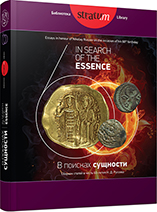


Book review: "Шикирлик-Суворово: два века в истории (1815—2015)"
More...
Keywords: Old Rus; princely tokens; sealing marks; Rurik dynasty; Monomach dynasty
Another Old Russian sealing mark was found in 2019. On its obverse, there is an image of a bident, and a two-line inscription СВѦ on its reverse, carved in the stamping mold, without allowing for the print. The token on this sealing mark belongs to an earlier unknown type. It was owned by one of Vladimir Monomach’s descendants. Rarity of tokens similar to the discussed one suggests that owners of tokens from this group could make up a small and probably early extinct branch of Rurik family. The bident on the discussed sealing mark could be owned by Svyatopolk († after 1192), one of Mstislav the Great’s grandsons and Vladimir Mstislavich’s son.
More...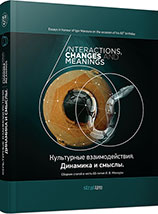
Keywords: Precucuteni; Cucuteni A; chronological horizon
Basing on a compact analysis of the Precucuteni dwellings’ construction, evolution of ceramics, anthropomorphic representations and funerary rites, the author finds inappropriate the term of „Precucuteni culture”, spread in Romanian archaeology, pointing rather to a linear evolution between Precucuteni and Cucuteni A stages. Thus, Precucuteni is rather a distinctive chronological horizon within Precucuteni-Ariuşd-Cucuteni/Trypolie Cultural Complex, with three evolutionary phases. Consequently, this article brings arguments in favour of using the term „Precucuteni chronological horizon” as part of Precucuteni-Ariuşd-Cucuteni/Trypolie Cultural Complex, which corresponds, generally, to phase Trypolie A (according to Passek’s periodization).
More...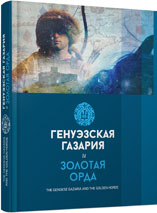
Keywords: Lower Volga Region; Saratov; Uvek Hillfort; Golden Horde Town; historical topography;research history;
The author publishes some new recently obtained and analyzed data related to historical topography of a Golden Horde city of Ukek. He specifically examines history of field research on the Uvek Hillfort, which dates back to 90s of 19 th c. His special focus in examining natural and geographic factors is on peculiar local topography affected by some landslides, as well as on a high hill with a flat top (the Uvek Mount), which gave the name to the city — Ukek, from a Mongolian word meaning ‘plateau’. Changes in landscape caused by either natural or anthropogenic factors are also assessed. New data on fortifications and hydraulic structures of the hillfort, a rich estate, a hammam, kilns and a mausoleum are also published and discussed in the article.
More...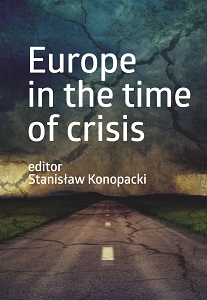
Keywords: lingual performance;regional movements;Silesia
It is well known that since the 1980s the political importance of regional political movements in Europe has grown ever more and yet there exists a huge amount of mostly political and sociological investigations about the phenomenon. The majority of the authors seem to agree, that the regionalist movements should be viewed in relation to discrepancies between the respective national government and the supranational European level.
More...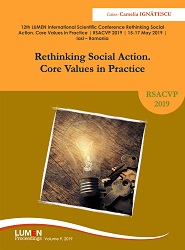
Keywords: Workplace deviant behavior; Employee deviance; Organizational ethical climate; Code of ethics; Business Ethics;
This study investigates how ethical climate and perceived existence of organizational ethical codes impact employee deviance. Due to the importance and extensiveness of the employee deviant behavior problem, it is found denotative to examine the antecedents contributing to the occurrence of employee deviance in organizations. In the light of the previous literature study, several factors that have been associated with employee deviance have been reviewed and it was seen that workplace ethics was examined as a contextual variable influencing such behaviors in the organizations. Thus, in the current study, it was aimed to evaluate the impacts of existence of ethical codes and ethical climate on employees’ deviant behaviors within the organization. A quantitative survey was performed among 230 employees in public and private organizations in various sectors, such as education, health, insurance, banking, telecommunication, and retailing. The data obtained from the research were evaluated with statistical programme and the findings revealed that all five dimensions of ethical climate had significant impacts on organizational deviance. The instrumental and independence dimensions had positive impacts on organizational deviance, whereas caring, law and codes and rules dimensions had negative impacts on such behaviors. Further, it was reported that the perceived existence of organizational code of conduct had significant negative impact on organizational deviance. The findings of the research were evaluated and discussed with the implications of the previous empirical findings and both conceptual and practical suggestions were provided for the future studies.
More...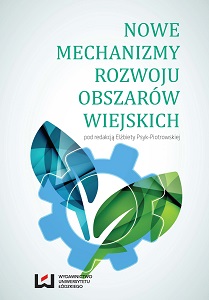
Keywords: Local government;NGOs;cooperation;New Public Management;Governance;New Governance
The chapter presents new concepts of management of the municipality known as New Public Management, Governance and Good Governance. One of the manifestations of the implementation of the concept of Governance in local governments is to build positive relationships with NGOs. The basis of these relations is the creation of programs of cooperation with NGOs. The basis of such programs is structured report prepared by the Collegium Civitas is a Model of cooperation of public administration and non-governmental organizations, outlining standards of intersectoral cooperation. An increasing number of municipalities realize the benefits that optimal cross-sector cooperation can bring. The example ranking “Friendly Local Government” and its results shows the effects of test implementation of the concept of Good Governance in local government units. Results Achieved by the selected municipalities Podkarpackie voivodship show that more and more governments transformed from a bureaucratic management style to partnership.
More...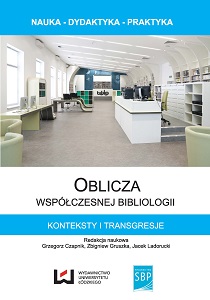
Keywords: relationship of library;information science;citation analysis;literature;1956-2006
The subject of analysis were articles from Polish journals on library and information science, published between 1956 and 2006. The author indicates the main lines of research and demonstrates the impact of foreign literature on the Polish works through the analysis of foreign bibliographic citations. The analysis of the formal and material characteristics of the cited documents allows to show relations between the native and foreign scientific literature, with emphasis on revealing how research topics and academic disciplines are interwoven.
More...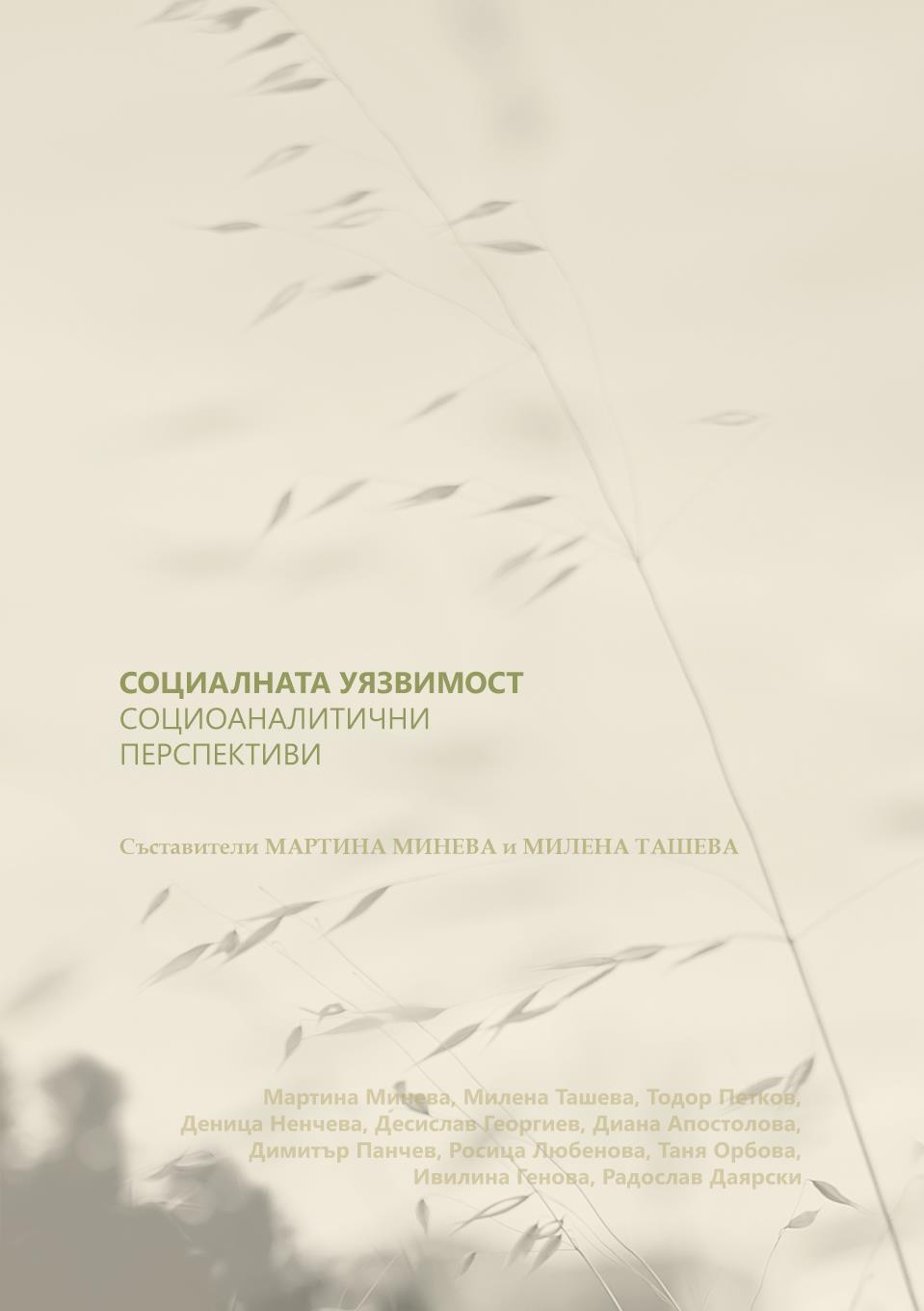
Keywords: sociopanalysis of self-inheritance; social suffering and vulnerability; socioanalytic research
Starting from outlining the context within which the project “'I have no one to turn to!’ - socioanalytical dimensions of vulnerability” is located, the article presents the theoretical and methodological explorations and solutions of the project team in the course of preparation and carrying out of the socioanalytic study of nine cases. The focus of the text is on the presentation of the main aspects retained by the team of researchers in the development, field approbation and editing of a methodological instrument for the socioanalytic study of cases of socially generated suffering and vulnerability – the Project for a Socioanalytic Protocol. These aspects are summarized as follows: 1. Practice of understanding in the socioanalytic conversation; 2. Analytic techniques of microscopic practical-logical analyses of data; 3. Socioanalytic interpretation of the socioanalysis-relevant data on the practical logic of the studied persons; 4. Reflexivity and self-reflexivity of the methodology and of the socioanalyst. Finally, the article presents summaries of the upcoming problems, the achieved results and the drawn conclusions in the theoretical, methodological and research work of the team that make contributions to the development of the larger theoretical project on the socioanalysis of the self-inheritance of agents who have fractalized personal identities.
More...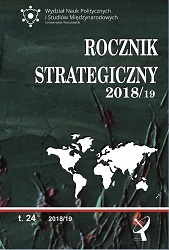
Keywords: Germany; European Union; China; United States; “balanced partnership”
According to the Minister of Foreign Affairs, Heiko Maas, the main challenges forthe international order Germany not only knows but also has become accustomed to,are Donald Trump’s egoistic policy, Russia’s attacks on international law and statesovereignty, and the expansion of China.Germany is a country that wants to maintain the status quo. In the last decades,thanks to US protection, Germany only spent a small portion of its GDP on defenceand could focus on economic development instead. However, the ongoing changesin the global balance of power undermine the possibility of keeping it that way.The Chinese-American competition for primacy in the contemporary world hasserious consequences for Germany as well. Germany’s plan to build economic andpolitical relations while presenting the country as a civilian superpower is becomingincreasingly challenging for the authors of German foreign policy.
More...
Keywords: power politics; Iran; Middle East; foreign policy; strategic culture
The current frictions in the Middle East are a “microcosm” of power politics, closeto the vision of Thomas Hobbes and his bellum omnium contra omnes. This visionreflects very well the specifics of the Middle East, but also a security perception ofthe Islamic Republic of Iran, whose decision-makers invariably believe that almostthe entire region, and even a large part of the world, conspire against their state.From the Iranian perspective, Tehran is involved in a war of all against one – theIslamic Republic.The aim of this paper is to show how Iran approaches the contemporary internationalsystem and how it is trying to pursue its interests in a world of growing competition,emerging blocks and ongoing destabilization of the Middle East, where tensionshave been clearly increasing. This paper also tries to determine how consciously Iranenters this geopolitical game and to what degree it is forced to do so.
More...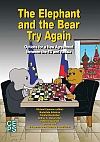
Keywords: EU-Russia inter-subjective (dis)connections; Political communication;
The concept of this paper is grounded in the understanding of EU-Russian relations as an encounter of two subjects in transformation, conducive to the formation of a sphere of inter-subjective communications that might be either divisive or cooperative. Both connections and disconnections between these two international subjects are discursively moulded and, therefore, grounded in a certain type of vocabulary with a number of interrelated concepts at its core, including those of neighbourhood, exceptionality and the political. It is exactly through comprehending this vocabulary that one can unravel the logic of deep asymmetry embedded in the EU-Russian relationship.
More...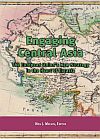
Keywords: Democratisation; Human rights; Central Asia; Communist Party of the Soviet Union;
To understand the reasons for the relative failures of the transition to democracy, the formation of a law-based state and the establishment of respect for human rights in the independent states of Central Asia today, as well as the role of the international community, one has to assess, first of all, the dynamics of the political process in this region of the world. In large part, the origins of the current weakness of democratic processes are theresult of developments during the final decades of Soviet power.
More...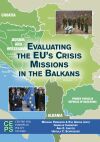
Keywords: Governance; EU Crisis management; coherent planing;
This chapter assesses the translation of recent European Union crisis management concepts into practice. In its quest for a comprehensive crisis management policy, has the EU been able to move from strategic concepts to coherent planning? Assuming an institutionalist perspective on organisational change, the chapter explores the gap between crisis management concepts and the organisational realities of everyday and work-level interactions. Through tracing the development of crisis management coordination in the EU architecture, the chapter takes stock of the successes and failures in the EU’s governance of its policies in this area. It contends that the Council and the Commission have followed different organisational strategies for implementing comprehensive crisis management operations and outlines three general trends in their relationship: convergence, coordination and compartmentalisation.
More...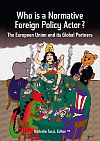
Keywords: Comparative politics; Foreign policy; UN; China; India; EU; USA; Russia;
The conceptual framework presented in chapter 1 of this book to assess normativity in foreign policy presumes that any international player can act in a variety of ways in different foreign policy instances. In this final chapter we shall conclude by attempting the difficult task of comparing such normativity in the foreign policies of the five major global actors, selected in view of their population sizes and permanent seats on the UN Security Council – China, India, EU, US and Russia.
More...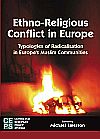
Keywords: Political radicalisation; Religious radicalisation; Belgium; Ethnic minorities studies; Security;
In a multicultural society such as ours the risk of micro conflicts is always present and in fact unavoidable. The realities we have analysed can easily lead us to predict that issues such as evolution of the political situation in Iraq and the related reaction of Turkey is likely to create tensions between the Turkish and Kurdish communities living in Belgium. Likewise, the liberation of Palestine will continue to be a major issue of mobilisation and tension for Belgian residents with Arab sensibilities and groups such as the ones we have observed will certainly try to capitalise on the unrest. And of course, xenophobic and fear-mongering parties in both the North and the South of the country are likely to use tensions (or an eventual terrorist attack) as grounds for promoting their own agendas. On the whole, however, Belgium’s Muslims are likely to remain no more radicalised than their Christian or their Jewish compatriots. At a time when religious radicalisation has become almost synonymous with Islamic radicalisation, it is important to remember that the need for political parties that express religious concerns or are inspired by a faith-based world view is present in all communities and is not likely to disappear as long as there are persons who place faith high among their priorities. As for political radicalisation, the phenomenon does occur in Belgium in many contexts, and unfortunately no faith, language, culture or any other element-based community is immune.
More...
Keywords: Radicalisation; Muslims in UK; security; violence;
Many theories have been offered about the drivers or causes of radicalisation, but they are rarely able to prove more than the exception, never the rule. In fact, it is almost impossible to say with any certainty what the causes are as it is so difficult to know whether a factor is instrumental, or merely present. It is perhaps more helpful to think about ‘radicalising agents’ – factors that are present (though not necessarily causal) and which appear frequently across different cases. This chapter highlights a number: key places, charismatic leaders, relationship links, experiences and stated and assumed grievances.
More...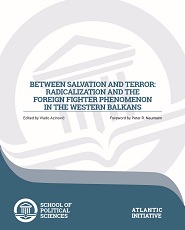
Keywords: North Macedonia; Macedonia; foreign fighters; terrorism; Western Balkans; terrorist threats; security; Salafism; religious radicalism;
The topic of religious radicalism in the Western Balkans has long attracted the attention of media, researchers, and security services. Ill-advised policy approaches to the issue, along with a lack of knowledge and information, mean the phenomenon has often been misused for political aims. In the last decade, reports about “growing terrorist threats,” “Islamic terrorism,” “terrorist training camps,” “dangerous Salafists,” etc. have burgeoned, with most of these “warnings” coming from self-proclaimed “security experts” and irresponsible politicians – who are regularly invited to present their security assessments in the media and at various conferences. Several incidents involving Salafi adherents from the region have further contributed to the idea that the Western Balkans is under threat from religious radicalism. In this climate, full of unconfirmed information and irrelevant speculation, security services have occasionally tried to calm the situation and relieve feelings of uncertainty among citizens by issuing official statements. [...]
More...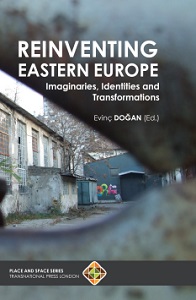
Keywords: US; Yugoslavia; international relations; cultural encounters; art; 20th century; cold war; diplomacy;
This paper discusses the role of art in Cold War diplomacy in Yugoslav-US relations between 1961 and 1966. During the 1960s, culture was often, sometimes unwittingly, at other times intentionally, infused with the politics of the Cold War. According to one line of existing scholarship, the rise of US art after WWII and exhibitions of American art abroad amounted to cultural imperialism and a “profound glorifying of American civilization.” These historians persuasively identified the political motives behind the exhibition strategies of American museums, such as MoMA’s promotion of Abstract Expressionism through the International Program of Circulating Exhibitions (established in 1952), or the US Government’s Central Intelligence Agency endorsement of US art through its offices around the world. Accordingly, Abstract Expressionist works were staged as par excellence representations of America’s democratic values, where the messages of freedom and individuality behind the works of such artists as Jackson Pollock were contrasted against the tyranny and totalitarianism of the USSR. Indeed, John Hay Whitney, Chairman of the Museum of Modern Art, explicitly stated that the role of the Museum and of art is to “educate, inspire, and strengthen the hearts and wills of free men in defence of their own freedom.”
More...